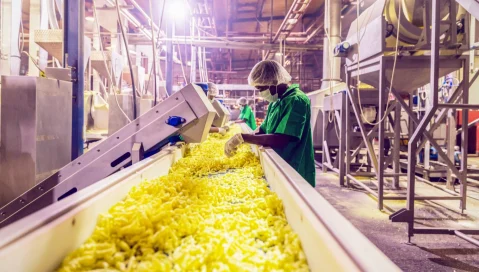Food Fraud: How Can You Protect Your Business?
Food Fraud: How Can You Protect Your Business?
Food Fraud: How Can You Protect Your Business?
15 Juin 2021
Jack Payne
Food fraud—also known as Economically Motivated Adulteration (EMA)—is a major area of concern across all levels of the food industry and for consumers. The impact of food fraud can be devastating—both for the finances and reputations of the businesses that fall victim to it and for the health of affected consumers.
And with food fraud believed to have intensified during the COVID-19 pandemic, all stakeholders in the global food supply chain need to act to protect themselves and consumers. Here we take a look at what exactly constitutes food fraud, what the cost of this criminal activity is and how businesses can prevent themselves from being affected.
What Is Food Fraud (Economically Motivated Adulteration)?
Food fraud has a number of definitions, but is generally considered to be fraudulent activity or dishonesty in the trading of food products or ingredients. This dishonesty can pertain to the contents of the food, its production, its origin or the way it is labeled among other factors. In practice, food fraud can range from misrepresentation of a food product to actually tampering with the food itself. In all cases, the motivation behind food fraud is financial gain—whereby criminal parties intend to make a profit off of substandard food.
Food fraud can occur anywhere, but businesses are especially susceptible at early points in the supply chain when sourcing raw products and ingredients. The factors that make food fraud easier to perpetrate include opportunities and blind spots in supply chains, a lack of due diligence and poor supply chain management on the part of the affected company and a lack of industry oversight.
While every part of the food industry is open to food fraud, certain foods are thought to be most at-risk due to how easy it is to supplement, replace or dilute them with poor-quality or dangerous ingredients. These include:
Olive oil
Tea & coffee
Spices
Honey
Milk
Seafood
Fruit juice
What Are the Impacts of Food Fraud?
Instances of food fraud occasionally enter into the public consciousness in a major way—such as the 2013 European horsemeat scandal. But more often than not, reported food fraud has a quieter, albeit no less damaging impact on businesses in terms of their finances and reputation within the industry.
The true impact of food fraud is difficult to estimate due to the level of fraudulent activity that is not spotted, however some sources estimate the global cost to be upwards of $40 billion annually. If your business was to unwittingly purchase sub-quality ingredients, you’d essentially throwing away money to produce a lower standard of product—and that would be before we even consider the legal costs you could face for selling products with dangerous constituent ingredients.
Food fraud has been known to be dangerous and even deadly on a large scale—such as the 1981 rapeseed/olive oil scandal in Spain. This is the main reason why food businesses like yours have a responsibility to guarantee the safety and quality of every ingredient being used in their products. Another consideration concerns products that are marketed as organic, vegetarian or vegan, or as satisfying religious requirements (e.g. halal meat or kosher products). If these claims are invalidated by food fraud, the financial and reputational cost can be huge.
A survey by NFU Mutual found that 50% of respondents would never again buy from a company implicated in an instance of food fraud. Clearly, it is in your best interest—not to mention that of your customers—to ensure food fraud doesn’t infect the global food supply chains.
What Are the Different Types of Food Fraud?
Food fraud occurs in a range of different ways. If you’re involved in sourcing food and ingredients, here are some issues you should be vigilant of:
Substitution—replacing all or part of a food product with a different ingredient that is cheaper and lower quality.
Dilution—a common form of food fraud in liquid products where a lower-value liquid is used to “top up” the product.
Counterfeiting—sale of an ingredient that purports to be from a trusted brand, but which is actually a lower-standard deception.
Unapproved enhancement—the undeclared addition of extra ingredients or materials to present the illusion of a higher-quality product.
Mislabeling—false information on a product or ingredient’s documentation.
How Can You Prevent Food Fraud?
Food fraud is characterized by deceit and often perpetrated by criminal groups which are well prepared to avoid detection. This makes it difficult to prevent, but there is growing awareness that greater action needs to be taken.
As with any major challenge in the food industry, true success can only come from joint action on the part of industry regulators and individual businesses. However, there are a number of ways in which your business can protect itself from falling victim to food fraud.
Risk assessment. This action comes before any agreements have been made to purchase ingredients. Your business should carry out an assessment of the ingredient market and any history of fraud, the state and composition of the products and the price of the products in relation to standard industry pricing.
Authenticity testing. Regular testing of ingredients at multiple stages of the supply chain are vital. Tests should be carried out in comparison to reference materials in food fraud databases recognized under global standards like ISO 17025.
Education. Everyone involved in the procurement process and other key points of the supply chain should be fully trained to spot instances of food fraud or potential red flags. For example, the University of Minnesota’s Food Protection and Defense Institute offers such courses.
Technology. With food supply chains growing longer and more complex, the need for a technology stack that keeps you in control has never been greater. Solutions like modern food and beverage enterprise resource planning (ERP) harness the power of real-time data collection and cloud computing to generate one source of data truth. This gives you full visibility over your supply chains and true end-to-end traceability, helping you avoid food fraud and root out any instances that do occur before they can cause harm
Aptean’s Food & Beverage ERP system comes complete with advanced traceability features to give you a new level of confidence in your business’s supply chains. To learn more about how these features can help your business avoid food fraud, as well as boost the efficiency and profitability of your operations, contact our team of food and beverage industry experts today.
Prêt à transformer votre entreprise ?
Nous avons les solutions ERP spécialisées dont vous avez besoin pour relever les défis de votre secteur.



